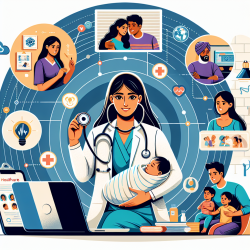The perinatal period is a critical time for both mothers and their developing babies, yet it is also a time when gender-based violence (GBV) can have particularly devastating effects. Despite its prevalence, GBV is often under-reported, leaving many survivors without the support they need. A recent study titled "How to Facilitate Disclosure of Violence while Delivering Perinatal Care: The Experience of Survivors and Healthcare Providers" sheds light on how healthcare providers can better facilitate disclosure and support survivors.
The Importance of Awareness and Education
One of the key findings from the study is the need to raise awareness about GBV among both healthcare providers and the general public. By increasing awareness, we can help de-stigmatize disclosure and encourage more survivors to seek help. Healthcare providers should be trained to recognize signs of GBV and respond appropriately. This includes creating a safe and supportive environment where survivors feel comfortable sharing their experiences.
Building Trust through Relationship-Based Care
The study emphasizes the importance of adopting a relationship-based approach in healthcare settings. This means moving away from task-oriented care and focusing on building trust with patients. Continuity of care is crucial, as it allows for stronger relationships between providers and patients, making it more likely that survivors will disclose their experiences.
A Multicultural Approach
Cultural sensitivity is another important factor in facilitating disclosure. Healthcare providers should be aware of cultural differences in how GBV is perceived and experienced. By understanding these nuances, providers can offer more tailored support that respects each survivor's unique background.
Providing Support for Both Survivors and Providers
The study also highlights the need for better support systems for both survivors and healthcare providers. Survivors often face financial barriers to accessing counseling services, which can deter them from disclosing violence. Ensuring that these services are covered by insurance could encourage more survivors to seek help.
Healthcare providers also need support in the form of training and resources to effectively address GBV. Reducing workloads and providing compensation for time spent on GBV-related care can help providers give this issue the attention it deserves.
The Path Forward
The findings from this study offer valuable insights into how we can improve the response to GBV during the perinatal period. By raising awareness, fostering trust through relationship-based care, adopting a multicultural approach, and providing robust support systems, we can create an environment where survivors feel safe to disclose their experiences.
If you're interested in learning more about how to facilitate disclosure of GBV during perinatal care, I encourage you to read the original research paper: "How to Facilitate Disclosure of Violence while Delivering Perinatal Care: The Experience of Survivors and Healthcare Providers".










